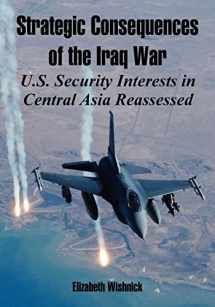
Strategic Consequences of the Iraq War: U.S. Security Interests in Central Asia Reassessed
ISBN-13:
9781410221827
ISBN-10:
1410221822
Author:
Elizabeth Wishnick
Publication date:
2005
Publisher:
University Press of the Pacific
Format:
Paperback
60 pages
FREE US shipping
Book details
ISBN-13:
9781410221827
ISBN-10:
1410221822
Author:
Elizabeth Wishnick
Publication date:
2005
Publisher:
University Press of the Pacific
Format:
Paperback
60 pages
Summary
Strategic Consequences of the Iraq War: U.S. Security Interests in Central Asia Reassessed (ISBN-13: 9781410221827 and ISBN-10: 1410221822), written by authors
Elizabeth Wishnick, was published by University Press of the Pacific in 2005.
With an overall rating of 3.5 stars, it's a notable title among other
books. You can easily purchase or rent Strategic Consequences of the Iraq War: U.S. Security Interests in Central Asia Reassessed (Paperback) from BooksRun,
along with many other new and used
books
and textbooks.
And, if you're looking to sell your copy, our current buyback offer is $0.48.
Description
Central Asia is a key theater in the war on terrorism where fragile new states are attempting to consolidate political power, build legitimacy, and stoke economic development at the same time that they face a range of threats with security forces badly in need of reform. While the United States has recognized the pivotal role of Central Asia and greatly expanded its activities there, this is a new venue for America. U.S. policymakers are learning in stride as they seek ways to both strengthen the Central Asian states and to encourage them to undertake badly needed political reforms. In this monograph, Elizabeth Wishnick builds on the analysis in her important 2002 SSI study, Growing U.S. Security Interests in Central Asia. She contends that by highlighting antiterrorism, the United States addresses a symptom rather than the causes of instability in Central Asia; thus it is contributing to the radicalization of political opposition movements and discrediting both democratization and the U.S. commitment to it. Instead, she argues, the United States should do more to address the underlying human security problems in Central Asia, which increase its vulnerability to terrorist movements.


We would LOVE it if you could help us and other readers by reviewing the book
Book review

Congratulations! We have received your book review.
{user}
{createdAt}
by {truncated_author}


